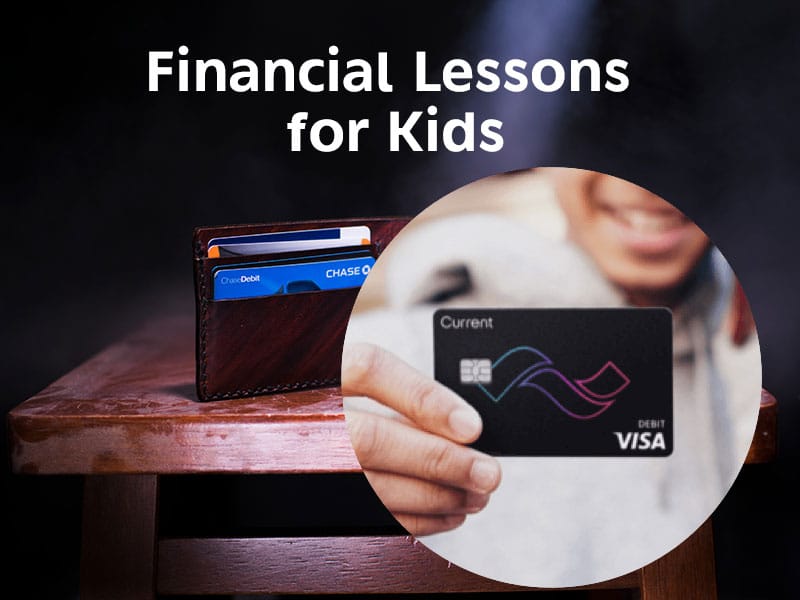Your credit score is one of the essential elements of your financial health. When teaching your kids valuable financial lessons, consider giving them a line of credit. A kid’s credit card could be a gamechanger for you and your family.
Before you determine whether it’s a good idea to provide your children with a credit card, it’s essential to understand what a credit card could do for your kid’s future financial stability.

Table of Contents
The Ins and Outs of a Kid’s Credit Card
Over 175 million Americans have credit cards. People use this credit option for various reasons, including convenience, emergencies, or the chance to earn rewards. Additionally, credit cards tend to provide consumer protections and limitations in liability that consumers appreciate.
Credit cards are a normal part of most people’s lives, as is their credit score. This score is a number based on your credit report that lenders use to determine whether you are safe to lend to. To obtain loans, mortgages, and a vehicle, you need to be established credit.
When you think of credit card users and credit scores, you probably think of adults. However, while persons under 18 cannot typically have a card on their own, options for a kid’s credit card are available.
Authorized Users
Kids do not have the credit history available to apply for cards themselves. For your child to obtain a credit card, they usually have to be an authorized user on one of your accounts. The child has access to the card and the balance on the card but does not have complete control over it. In some cases, you can be a co-signer on your child’s credit.
Age Restrictions
Many lenders provide kid-friendly credit card options. Financial institutions know that some parents want their children to get an early start on their financial health and provide opportunities for kids to practice responsible spending with their first credit card.
There may be age restrictions to keep in mind when obtaining a kid-friendly card. Most lenders require the lendee to be over 13 to be a user on a card.
When To Give Your Kid a Credit Card
Every child reacts differently to having and using a kid’s credit card. It is up to you to determine your own children’s limitations and strengths. When it comes to offering your child a credit card, take into consideration various factors.
After all, even adults can make significant mistakes with their credit cards. While building credit is a learning curve, you must ensure your kid is ready to start learning.
Consider Maturity
Think about your kid’s social maturity. A socially mature person can adapt to various situations and shows him or herself to be compatible with others, sympathetic, and dependable. While kids and teens still have a lot of growing up to do, they reach different stages at different ages.
Can your kids make objective decisions and take responsibility for their actions? When you have a credit card, you are accountable for your choices. If you overspend, you still have to pay the money back. If you do not pay your bill, it can harm your credit score. These are lessons that kids have to learn to be accountable for.
However, you do not want to put a card in the hand of someone who is likely not to take responsibility or who you are certain will overspend.
Determine Financial Intelligence
Good candidates for a kid’s credit card are children who are willing to follow your rules and limitations. Determine in advance whether they should pay their bill or if they will give you the money to pay the bill. Additionally, set rules for when and where they can use the card. There should also be consequences for breaking the rules.
Having a credit card is a learning experience, but your kids should have basic knowledge regarding credit. Explain interest rates, credit limits, and balances ahead of time. Kids might not understand that interest rates make the purchase more expensive if they wait too long to pay off the balance.
Think about your kid’s experiences with money. Are they responsible spenders or does the money burn a hole in their pocket? Kids should only have access to credit once they understand that their actions have consequences.
Check Your Personal Credit
You must consider your own credit history if you plan to add your son or daughter as an authorized user. Whenever you add an authorized user, their credit behavior will affect your score. For example, if your kid excessively spends and cannot pay the bill, your credit score can also suffer. If you are in the middle of major financial decisions, you might not want to take risks at this time.
How To Help Your Kid Practice Responsible Spending
Giving your kid access to a credit card is not the same as offering them unlimited money to buy whatever they want. The goal isn’t to spoil them; it’s to teach them fiscal responsibility and prepare them for adulthood. About 15% of your overall credit report is the length of your credit history.
When you start your kids early, they have a better chance of having a higher score overall later.
Start Teaching Early
It is never too early to teach your kids the value of money. The earlier you begin the process, the more likely they will have a stable financial future. Young kids can start to learn about how money works as early as age 7. Introduce them to the concept of money and explain how to use it and how you earn it.
Additionally, show them your credit and debit cards and explain how they work. They should understand that the debit card has cash in the bank to back it up.
Once kids are old enough, teach them how credit cards work. Explain how financial institutions lend you money based on your income and credit history. Before children can have a kid credit card, they have to understand that all of the money they spend on credit has to be repaid to the bank. Additionally, there are limits to how much they can spend. Teenagers should be able to understand how interest rates work.
Help Them Earn Money
Early on, most kids only spend money. They watch you spend money on yourself and themselves but do not initially have a concept of earning or saving. As kids grow, they should begin learning how important saving money is. Especially with a credit card, they should have self-control and understand the importance of delayed gratification.
Teach your kids how important it is to earn their own money. You can start by offering an allowance for chores or setting your kid up to do cleaning, babysitting, or yardwork through the summer. In addition, you could encourage your kid to earn and save money by promising to add some of their own money to their savings. For example, offer 10% of the saved amount.
Be a Role Model
Your kids look to you for guidance. Your children will take note if you have out-of-control credit card debt or poor spending habits. Kids follow your lead in how to navigate the world. If you tell them to be financially responsible but don’t take your own advice, it sends mixed messages.
If you’ve struggled with credit card debt in the past, be open about it. Talk about your mistakes and the steps you are taking to better yourself.
You don’t have to have a perfect financial history. You have to learn from your mistakes and show your kids what it looks like when you take accountability for your actions. Explain that you do not want them to make the same mistakes that you did. Maybe if you had an education from an early age, you wouldn’t have found yourself in the situation you did.
While you don’t have to be perfect, you do need to show that you are putting forth an effort to do better so that your kid has a good role model to look up to.
Suggest a Secured Credit Card
A secured credit card and an unsecured kid’s credit card differ in that a secured credit card has fewer risks. The limit on a secured credit card is the deposit that you make. If your kid has money saved, consider using that for the credit card or determine a fair amount to provide as a deposit.
The deposit is an incentive to continue paying down the credit card. The financial institution uses your deposit to pay for any delinquencies on the account.
Some banks allow secured credit cards to become unsecured cards over time. Your kids can prove they can handle a credit card before obtaining a traditional line of credit.
Benefits of Using a Kid’s Credit Card To Build Credit
Some teens exhibit higher-risk behavior that might make it difficult to determine whether a credit card is a good idea. However, despite the risks, there are a lot of benefits to starting your teen using credit early, instead of waiting for them to apply for a card later on in life.
Kids Have Credit History When They Turn 18
Credit history is critical in adulthood. You might not qualify for a loan, mortgage, apartment, or vehicle without your existing credit history. If your child wants to rent their first apartment or receive financial assistance, they will have to build up the credit for it. Kids with a kid’s credit card have an advantage over their peers.
They don’t have to worry about building their credit alone and can build it under the guidance and supervision of their parents.
Under supervision, your kids are less likely to have significant issues resulting from irresponsible spending. Out in the adult world, they don’t have that luxury. Building credit in a controlled environment with adult instruction makes it less likely that they’ll make a costly mistake in the future.
Kids Learn About Finances
Think of a credit card like you would training wheels on a bike. A credit card teaches them how to manage credit and to keep spending habits in check. Credit cards provide instant access to funds, but it’s not intelligent to make large purchases if you can’t pay them off. Your kid will have to learn self-control early.
Most credit cards have an online platform to track spending habits. You and your kids can access the data to see where their strengths are. Not only does this teach young shoppers how to monitor their spending, but they learn how to use different online tools for financial management.
Kids Are Prepared for the Unexpected
One of the most important reasons to have a kid’s credit card is to afford unexpected expenses. The credit provides flexibility, and it also provides security. Say your kids go on a trip without you and get stranded somewhere. A credit card allows them to pay for transportation or other necessities quickly. Likewise, credit helps anyone in the case of emergencies.
You can instill in your children the value of setting savings aside for an emergency and having credit cards open for use in case anything happens.
Kids Understand Budgeting and Financial Independence
You no longer have to worry about your kids asking you to buy them something online or at a department store. If your kids want a new outfit, electronics, or another item, they must purchase it themselves. It teaches them to be independent with their money and to make choices without your input.
They have to balance the item’s cost with the payments they have to make over time. The more they spend, the higher their bill becomes.
Discover Credit Building Tips With Fiscal Tiger
Every person needs to have a credit history. Without credit, you cannot purchase a car or a home or seek a loan. While most people begin to build their credit from the ground up in adulthood, you can help your children get a headstart by providing them with a kid’s credit card.
At Fiscal Tiger, we are dedicated to providing you with the latest financial management information to help you build and repair your credit. Check us out today to learn more about setting up a stable, secure credit account.





